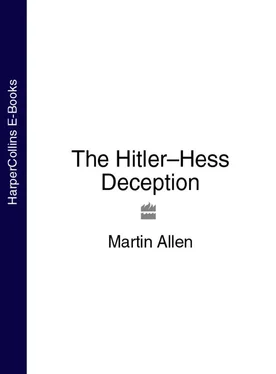Had Hess not fallen under Adolf Hitler’s spell in 1920, he would almost certainly have accompanied Albrecht into a life of academia. After five months of congenial friendship with Karl Haushofer – the relationship having quickly developed into one of devoted protégé and mentor – Hess quit his job at a Munich textile importers to enrol at Munich University as a student of geographical politics under Haushofer.
Who then, was this eminent Professor Karl Haushofer, the behind-the-scenes man of Nazi foreign policy, the sage figure consulted by the whole Nazi elite from Hess, Himmler, Göring and Ribbentrop, to Adolf Hitler himself ?
In 1946 Life Magazine published an article, dramatically titled ‘The Mystery of Haushofer’, that declared:
For something more than twenty years the voluminous writings and manifold activities of this German General, who later in life became a geographer on the faculty of the University of Munich, had engaged attention. He was discounted by many and dismissed by some as simply another obscure writer from Germany who exemplified the Teutonic passion for obscuring the obvious with unintelligible terminology. But by others he was considered a subtle and dangerous influence in the evolving challenge of National Socialism, a close collaborator with Rudolf Hess, Deputy-Führer, and the master genius of an organised movement designed to justify, by scientific argument, the Nazi gamble for total power.
The article went on to reveal that:
Through Haushofer’s pupil, Rudolf Hess, a vengeful philosophy of power and a technique for achieving it were communicated to Hitler, who avidly seized on the windfall and capitalised ruthlessly on the half-truths popularised in the name of objective science. [This] venerable scholar thus became not only an elder statesman in the field of geographical strategy but developed into a companion and political Nestor of the ruling clique … He testified under oath that he had been consulted on Japanese affairs by von Ribbentrop and was frequently summoned to the Foreign Office in Berlin. His residence on Kolbergerstrasse in Munich was the rendezvous for conferences between Nazi leaders and Japanese statesmen during the courtship of Nippon by Nazi Germany. 9
Karl Ernst Haushofer was born in 1869, at the time of the creation of Germany as a state, and thus during his early years he grew to see Germany develop, gain colonies, prosper, and become a major power on the world stage. After a brief period of military service with the First Bavarian Artillery Regiment in the late 1880s, he secured a position with the Auslandskommando (the Foreign Service), and was posted to Germany’s distant Embassy in Japan.
The experience was a revelation to the young German, and after two tours of duty in Tokyo, during which he set himself the task of learning to speak fluent Japanese, and learned all he could about Japanese society, Haushofer returned to Germany in the early 1890s, taking up a post with the General Staff to teach at the Military Academy. He did, however, continue to conduct regular tours of the Far East, during which he almost certainly carried out some form of intelligence-gathering. Indeed, in 1942 British Intelligence would assert that Haushofer spent two years on attachment to the Imperial Japanese Army, and that during this time he also ‘conducted several extensive tours Greater Asia – India, Japan, China, Korea, and Asiatic Russia’. 10This was a region of great sensitivity to Britain at the turn of the century, a source of much wealth and power to the British Empire, and she would not readily accept German attempts to usurp her position here. Haushofer’s trips were noted and logged away, but they were not forgotten.
In 1896 Haushofer courted and wed a certain Fräulein Martha Mayer-Doss, the half-Jewish daughter of a high-ranking Bavarian civil servant. The new Frau Haushofer’s ethnic background raised few eyebrows in Germany at the time, for the country had one of the better records in Europe with regard to the treatment of its Jewish citizens. In the 1940s, however, British Intelligence would speculate that it ‘accounted for the fact that Haushofer does not hold any official positions in the leadership of the National Socialist State’. 11This was a misreading of Haushofer’s situation in Nazi Germany. Haushofer’s importance to the top Nazis protected him and his family from the fate that daily befell other Germans with Jewish connections. Indeed, Haushofer’s eminence would cause Hitler to welcome his elderly adviser and his wife as visitors to Berchtesgaden, where, unknown to Germany’s populace, the Führer always kissed Martha’s hand on meeting her, and treated her with the greatest courtesy and respect. It was a feature of Nazi Germany that what took place behind the scenes was frequently at odds with public appearance and policy.
After his marriage, Haushofer abandoned his military career, determining to carve out a new niche for himself in academia as a geographer. In 1898 the Haushofers visited Britain, where Karl was to conduct a series of lectures on ‘Internationalism’. It was during this tour that he first learnt of a theory that he would one day develop into geopolitics. During this trip, he also made several important contacts that would stand him in good stead in the coming years. In London he met the Colonial Secretary, Joseph Chamberlain (father of Neville Chamberlain), considered at the time to be very much the coming man of British politics. After this the Haushofers had planned to travel on to Cambridge, where Karl was due to give a lecture. However, they first went to Oxford, where Karl made the acquaintance of a young Scot by the name of Halford Mackinder, a geography don who was developing an exciting new theory concerning the Eurasian ‘heartland’ (Eastern Europe and interior Asia) which, he claimed, would by ‘natural ascendancy eventually gain superiority’ over the ‘maritime lands’.
Mackinder was taking his first tentative steps in the new science of what Haushofer would one day adopt as his own and name geographical politics. It was from this meeting at the end of the nineteenth century between two men steeped in the application of Empire that Karl Haushofer went on to develop his theories of a dominant Eurasia. It was a concept, he immediately realised, that could become the basis for a land-based German empire to mirror the British, which was based on maritime supremacy.
It was a very quiet and thoughtful Haushofer who left Oxford a few days later, for he knew that what Mackinder had told him was important. By the late 1890s, Germany was in an arms race with Britain, pouring millions of marks into building ever more sophisticated and powerful battleships to keep the sea routes to her colonies open in time of war. But what if Germany changed the rules? What if she threw away her overseas colonies in exchange for a land-based empire? In this way she could circumvent Britain’s naval supremacy, rendering the British fleet largely impotent. It would take a great deal of theorising over the coming twenty years before Karl Haushofer’s concepts on geographical politics would be completely formulated, but by then Germany had suffered defeat in the First World War, and as a result had already lost her colonies and an empire. Thus Haushofer’s theories gained a disproportionate importance.
Following their visit to Oxford, Karl and Martha Haushofer travelled on to Cambridge. Here the Professor was due to complete his British tour with a lecture to the Cambridge Foreign Science Students Committee. The Secretary of this society was a Cambridge lecturer by the name of Herbert Roberts, and the Haushofers soon became firm friends with him, his wife Violet and their son Patrick, a brilliant young student at Eton.
Over the next forty years the two families would maintain their friendship, the Roberts visiting Germany to stay with the Haushofers at their Bavarian country home, Hartshimmelhof, and the Haushofers making return visits to Cambridge. Herbert Roberts and Karl Haushofer’s friendship was to be mirrored by their sons, Patrick and Albrecht.
Читать дальше












